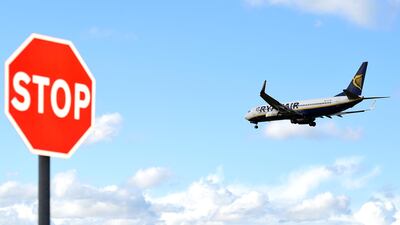At his recent AGM in Dublin, Michael O’Leary, generally known as the “feisty boss” of Ryanair, raced through his slide presentation with unaccustomed speed.
It was a familiar picture: Europe's favourite airline; lowest cost; cheapest fares (average €41, or Dh178); 131 million passengers in 2017, double the figure of five years ago; 87 bases; 200 airports; 240 aircraft on order, and so on.
"Next slide," he snapped before anyone could ask any questions. Normally he welcomes them as an opportunity to vent some of his passionate dislikes (the Irish government, Brexit, and even – or rather particularly – his own passengers, more or less in that order). But not this year. It should have been, as he complained afterwards, “a day of celebration”. The shares have risen more than 30 per cent this year and profits are up 43 per cent to €1.5 billion, with more to come. But it wasn’t.
Mr O’Leary, perhaps for the first time in his business life, has been put on to the back foot by the developing controversy over his decision to cancel 2,000 flights, basically to help the others get back on time. As he keeps pointing out, this is only 2 per cent of Ryanair’s schedule, but that doesn’t help those stranded overseas or encourage confidence in the others.
This is not quite a Willie Walsh moment, but it is heading that way – and may actually signal something more serious than BA’s computer break-down and its chief Mr Walsh’s clumsy response. Despite its superb financial performance, aviation experts are suddenly questioning whether Ryanair’s meteoric growth may have outgrown even Mr O’Leary’s capacity to control it.
Ryanair is a great story, a legend not just in Ireland but in the annals of aviation, which Mr O’Leary tells very well. The low-cost airline now carries more international passengers than any other airline, and has just moved up to fourth in the world rankings for total traffic, after the US biggies, American, Delta and Southwest, which are basically domestic carriers. Its market value is US$22bn, more than IAG, which has been around since air travel began, and nearly twice that of EasyJet. Mr O’Leary can take credit for creating a bigger company than Michael Smurfitt, Denis O’Brien and Tony O’Reilly, three legends of Irish business, did between them. No Irishman has achieved more.
And yet, for all his successes and accolades, his current problems have rattled even his habitual air of aggression and self-confidence – as shareholders witnessed at the AGM. Most airlines run short of passengers. Ryanair has run short of pilots. It has more than 2,000 of them, working longer hours, making more flights for less money than their counter-parts in the more traditional airlines. Any complaints are dismissed by Mr O’Leary with his habitual string of epithets and the accusation that in the digital age they are no more than glorified coach drivers (which actually has an element of truth). Inconveniently, however, even coach drivers are entitled to holidays, and there’s the rub.
_______________
Read more:
Ryanair pilots get pay hike but may have to change holidays
EU approves German loan for insolvent Air Berlin
Are airline seats going to get even smaller?
_______________
The low-cost airline season used to be seasonal, which meant holidays could be taken when there weren’t so many passengers in the air. Now the season starts earlier and earlier and from April on, Ryanair is flying 10 million to 11 million passengers a month – which doesn’t allow for holidays. The recruitment and training of pilots (who pay Ryanair $50,000 for the privilege of qualifying to fly its 737s) has not kept pace with growth and more sympathetic airlines, notably the Gatwick-based carrier Norwegian Air Shuttle, are poaching them by the day. Reports last week suggested that 700 pilots have left since January, 140 of whom have gone to Norwegian, EasyJet, BA, or carriers in the Middle East and China – anywhere where the pay and conditions are better and they are treated with a little more respect. And maybe even take their holidays.
Hence the crisis for which, having rattled through all the good news, Mr O’Leary actually apologised to shareholders for. To give him his due, he doesn’t blame the pilots. The cancellations, he admitted, were due to a "significant management failure in our rostering department” and the cancellations were handled with BA-like clumsiness.
Mr O’Leary has lived with the problems of unhappy pilots and disgruntled passengers for years and they are meat and drink to him. His reputation, and that of Ryanair, is founded on his rudeness, which passengers were prepared to put up with it in return for ridiculously low fares and faithful time-keeping. Last year he changed tactics and decided to be nice, but only to passengers – niceness doesn’t include pilots. It was wearing thin at the AGM too and with journalists afterwards. He has a lot on his mind just now.
Aviation experts are pointing to a major restructuring of Europe's low-cost aviation sector, brought on by the failure of both Air Berlin and Alitalia. Mr O'Leary has made no secret of his hopes of picking up some the routes to be vacated and aviation experts have been reported in Handelsblatt and other newspapers speculating that the Ryanair cancellations are being used by the Irish airline to free up crew capacity so that it is in a position to take over Air Berlin routes.
In fact it probably represents something much more fundamental than that. The cancellation problems have exposed deep flaws in Ryanair’s management structure and it may be that the days of spectacular growth are coming to an end.
Just as Ryanair, as a nimble-footed and hungry newcomer, basically killed off Aer Lingus and made mince-meat of BA, it has now become the giant carcass for the new low-cost airlines, such as Norwegian – and even BA - to feed off.

